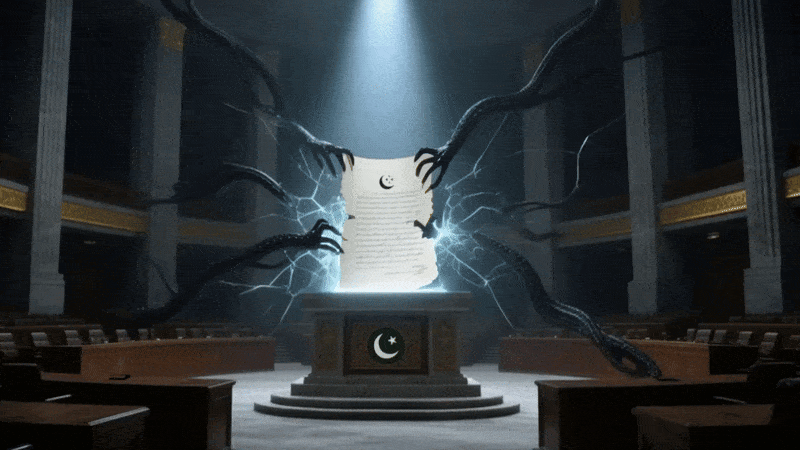“I looked around at that ceremony, at most of the awardees, and realized the rot that had set in: a constitutional colossus like him being honored in the company of pygmies and dwarfs… we have violated our oath to defend the Constitution, and the result is a marked regression in the judicial protection of human rights.”
— Justice Shahid Karim on granting Hilal-e-Imtiaz to late Justice Fazal Karim, November 17, 2023
One year ago today, Qazi Faez Isa stepped down as Chief Justice of Pakistan.
His parting gift was to overturn the decision on dissenting votes in parliament. We know this opened the floodgates for the 26th amendment, as once unbothered legislators were quickly forced to vote in favor of the judiciary’s funeral rites.
The bill was passed and the third branch was destroyed.
But although it obeyed the decision of His Lordship, the unity regime felt free to disobey that of the other lords in a different case: the reserved seats. It was enough of a challenge to secure the numbers for his amendment.
How, you may ask, does the executive overrule the Supreme Court whenever it wants? By precedent. Two years earlier, he had ignored orders from the Bandial Court to hold elections within 90 days. Only once the State learns to ignore some judges, it learns to ignore all of them.
As several dignitaries who decided the reserved seats issue discovered: it should not have been a surprise that their 12-member verdict was dismissed as casually as that of the Bandial Tribunal’s five; They had allowed it through strange dissenting notes in the 90-day case, and then supporting the practice of trash burning and the procedural law by chaining their own hands.
According to historian Edward Gibbon, “Those princes…who were allowed for a time to hold a precarious scepter, were removed from their thrones as soon as they had fulfilled their assigned task of subjugating the defeated nations to the yoke.”
And the last form of that yoke – the Constitutional Court – has more than fulfilled its promise: the reserved seats disappear, military trials of civilians arrive, and new lords parachute from the skies towards the last stronghold: the High Court of Islamabad.
The unity regime is not satisfied either. Their eyes are set on a bigger prize: the creation of the so-called Constitutional Court. If allowed to go ahead, what was the worst judicial regression in more than 30 years risks becoming the worst in Pakistan’s history. We look at the facts.
A crazy transplant from civil law
To begin with, Pakistan’s entire justice system is based on customary law, unlike that of civil law countries. To explain, common law systems (such as the United Kingdom and its former colonies, Pakistan and India) develop the law on a case-by-case basis, through precedent.
This cannot be overstated: stare (respecting what is decided) makes the law reliable and predictable, with judges relying on verdicts that have been handed down for decades and centuries. It also means trusting the courts to provide a degree of confidence in interpreting the law and protecting people.
History is at play here: in common law countries, independent and empowered judges were thought to protect the citizen from tyrannical kings (a recurring problem in Pakistan).
Civil law systems believe no such thing: there is no solid doctrine to serve as a precedent; code is everything; and judges are considered best when they apply the black letter of the law like faceless and nameless robots.
But civil law countries are also born from specific nightmares: France, their prime example, was forged in the fires of revolution, when judges were thought to be enemies of the people and instruments of class privilege. To restore order to the madness, Napoleon made sure to put the judges in a straitjacket.the mouth of the law‘…the mouth of the law, and nothing more.
That is already the opposite of Britannia and its South Asian heirs, where the courts only gained legitimacy when they opposed despots. While Napoleon’s France codified against judges, we developed common law through them.
Take also Germany, another well-known fan of civil law: its constitutional court is based on a culture of obedience and bureaucratic discipline. Pakistan, on the other hand, is always at risk from the gloved hand; its most basic traffic rules remain unresolved; and its judges are routinely forced to act as the last frontier against the derailment of democracy.
Does that sound like a place where judges should be reduced to bean counters?
Curiously, ours is the first ruling class to advocate for a civil law system that escapes neither the degenerate elites (France) nor the fascist dictatorship (Germany), but its own Supreme Court.
Supreme confusion: we already have constitutional courts
Although we state the obvious, constitutional control already corresponds to our highest courts: the superior courts and the Supreme Court. They are also more than happy to exercise that jurisdiction under Articles 4 and 199 (judicial review of executive action and fundamental rights), with the Supreme Court acting as the final arbiter through Articles 184, 185 and 187.
But the unity regime wants to strip them of that central function. The degraded Supreme Court, as this author has previously said, will now deal with civil nosebleeds, land disputes, and perhaps the occasional buffalo wandering into a stranger’s rice paddy. That is not a supreme court, nor what purpose is it.
This also completely breaks the third branch: from a relatively clear path (first instance courts to higher courts of appeal to a final Supreme Court) we now have a new forum with a dozen detours.
On the one hand, meaningless distinctions between “ordinary” and “constitutional” judges will fragment what is already considered one of the most broken legal systems in the world.
On the other hand, constant litigation over jurisdictional boundaries (what is a “constitutional” issue and what is not) will fill more dockets, consume more time, and eliminate more cases.
Finally, instead of our judicial structure being a coherent pyramid, we are destined for two competing vertices, with the result of doctrinal chaos.
An extra warehouse for docile judges
Which brings us to the reason why this amendment is being tabled in the first place. It is certainly not penance; a fallacious reason that only the most cynical and intellectually dishonest lawyers can express seriously. From 2024, according to the Law and Justice Commission report, Supreme Court cases will account for only 2 percent of the total pending cases in the country.
That’s right: the primary focus of the 26th and 27th Amendments (despite all the extensive havoc they have and will bring to the judiciary) leaves 98 percent of cases and 98 percent of the litigating public intact. (Even if we include all the high courts, there are still more than 80% left out in the cold.)
Because the litigious public was never worth protecting, not even a unity regime, that same public was expelled in the last election. As yet another cap on the unelected, the new federal court will now serve as a warehouse for docile judges: think of the Constitutional Court with a hundred times more square meters.
And as a means of executive capture, what a joy that will be: a smaller court will require fewer appointments to control; Its members can be grouped into a single political cycle; the favorites can audition from the provinces; and senior career Supreme Court justices with decades of independence can be immediately ignored.
Most importantly, by removing their consent from the equation, independent judges will be transferred from one province to another in the manner of ordinary bureaucrats. Imagine if, at the first sign of resistance, the center continued to ping-pong brave judges between Quetta and Karachi.
It even works the other way around: Those timid souls who make a career out of following the executive’s orders will have an added incentive not to have weird ideas and continue making one meaningless judgment after another.
Back to the future: new court, unprecedented
The appeal of any new system is the lack of a difficult past: why bother with history?
And since federal constitutional courts (at least European ones) tend to ignore precedent, we get to the real advantage: decades of pro-rights jurisprudence can be distinguished, overturned, or declared “inapplicable” under the new amendment.
The Constitution Bench has shown us a useful development: its decision on reserved seats is gloriously devoid of even the most basic logic, while the verdict of its military trials seems to be based on the impression that Pakistan remains frozen in the Bhutto emergency, and that judicial independence and the right to a fair trial never existed in the meantime.
Hence also the crux of our neo-PCOs, the 26th and 27th amendments: an embarrassing state of exception can become a proud law. Yes, there have been a few outliers. But overall, from 2009 to 2023, the post-restoration judiciary guarded its turf.
So the deep state has seen fit to create a new judiciary and change the very terms of that restoration: a process that began in earnest when the unity regime boasted that democracy could be overturned based on a fictitious 4-3 verdict in the 90-day case. It was the beginning of the end, with that end turbocharged by the year of Qazi.
In other respects, however, the judiciary may well be regressing to average. After all, Pakistan has never suffered from a shortage of constitutional courts; what has always tormented him is a lack of constitutional courage.
Or maybe ignorance.
It can be assumed that the vast majority of the regime’s tools punching the air in favor of a constitutional court do not have the slightest idea of the difference between common law and civil law countries (or that Pakistan is a common law country); of the role of precedent in shaping the law for decades; how the forced transfer of judges is a humiliation; or how foolish it is to blindly transplant foreign organs into a republic with its own zaman, makanand ijwan; of how an entire judiciary should not be sacrificed to win sordid little grudge disputes.
However, it can also be assumed that they will become experts in the field at the very moment when the levers of power fall from their hands and the benefit of independent judges becomes clear to them like thunder.
Hopefully sooner than when they write their own bail petitions.









